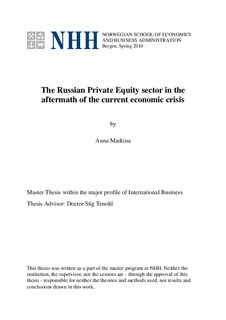The Russian private equity sector in the aftermath of the current economic crisis
Abstract
How has the modern financial crisis impacted Private Equity sector in Russia? This thesis argues that although the implications of the global economic recession on Russia are significant, in certain ways more so than for the Western economies, nevertheless, the Private Equity industry in Russia might be developing in a way different from other areas of the financial sector.
The thesis looks into the current economic environment in Russia describing the causes and implications of the modern economic crisis and outlining the consequences for different sectors of the economy. It further provides Private Equity definitions and theory and discusses the Modigliani-Miller theorem of irrelevancy of capital structure.
The analysis is based on a series of interviews with Private Equity professionals that provided data to determine what place the Private Equity sector occupies in Russian economy in the aftermath of the crisis and what are the trends forward in the context of a recovery process.
The findings demonstrated that Private Equity sector was not as substantially affected by the modern economic crisis, relative to the many other financial sectors. The thesis concludes that the Private Equity investors in Russia would not be taking a very pro-active role in the short-run coping with the immediate effects of the crisis, such as a scarcity of leverage and lengthened holding period in portfolio companies, as well as with the region-specific challenges. In the longer-run, however, the PE business would benefit from improved financial system regulations and more professionalised business community in the country where the growth potential is anticipated in consumer-oriented industries targeting the emerging Russian middle class.
